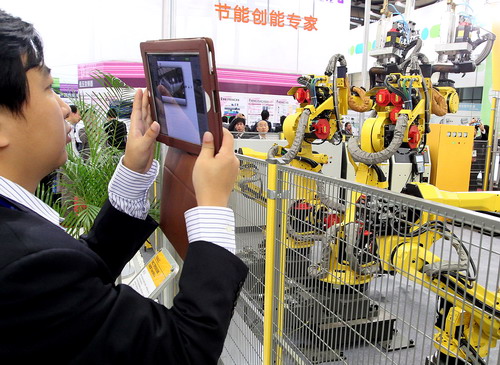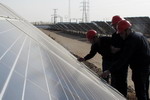China's industrial robotics market sees rapid growth
Updated: 2011-11-02 14:29
By Li Fangfang (China Daily)
|
|||||||||||
|
 |
|
An industrial robot on display at the China International Industry Fair on Nov 1, 2011 in Shanghai. [Photo/Xinhua] |
SHANGHAI - A top industry body says that China is the fastest-growing market for the use of industrial robotics. It is also the market with the most potential, according to an executive of the Swedish power and automation technology company ABB Group.
"We expect China's application of robotics to grow by at least high double-digits this year, providing the opportunity for our robotics business to register close to triple-digit growth by the year end," said Gu Chunyuan, head of ABB China's robotics business unit.
The application of robotics in Chinese industry has grown rapidly over recent years as a result of the country's efforts to improve efficiency of its manufacturing processes.
The International Federation of Robotics (IFR) said recently that in 2010 the growth rate for the application of robotics in China was 171 percent higher than in 2009, and that the country is the fastest-growing market in the world.
However, in 2010, China's applications numbered 52,290 units, less than 20 percent of Japan's 285,800, and 35 percent lower than Germany's 148,195.
The IFR predicts that the use of robotics applications globally will increase by between 10 and 15 percent in 2011, with the major demand coming from China and other emerging Asian markets.
The federation also said that industrial robotics applications in China will increase by 64 percent in 2012.
"We also believe the sector will continue its high-speed development in the coming years, because of Chinese concerns about the surging cost of labor, and manufacturing safety and efficiency," said Gu.
"The demand will not only come from the ventures of our long-term multinational partners in China, but also from Chinese manufacturers who are ambitious to compete with their foreign rivals."
Robotic applications have been used most widely in the automobile industry. ABB's technologies have not only been used by well-known international brands, but also on the production lines of Chinese automakers.
The ABB robots used recently by Great Wall Auto Co have helped provide the automaker's latest SUV, the Haval H6, with a shock-resistance capability 30 percent higher than that provided by common braze welding.
As the leader in the field of industrial robotics, ABB currently holds more than 20 percent of the global market share and has provided more than 10,000 robots to the Chinese market. In recognition of the future potential, the company relocated the headquarters of its global robotics business to Shanghai from Detroit, Michigan, in 2006, becoming the first multinational company to manufacture industrial robots in the country.
"As a robotics pioneer, ABB is making efforts to develop and aid the application of robotics in a variety of industries, such as the manufacture of electrical products, electronics and consumer goods. These applications help to greatly improve the quality of our customers' products, their productivity, and their working environment," said Gu.
Industry experts said about 50 percent of the production process of electronic devices could be performed by robots in the future.
According to Gu, an ABB robot can reduce the working time of "single-piece polishing" of electronics components from seven minutes to five and the "yield rate" for the process is increased to 93 percent from 87 percent. One ABB robot can laser-weld components at a rate 15 percent faster than that of the average human welder.
In August, the tycoon Terry Guo said that his Foxconn Technology Group, China's largest original equipment manufacturer of electronics, plans to replace human employees with 1 million robots over the next three years.
At present, the company uses 10,000 robots in its production processes.
Related Stories
Robotics conference kicks off in Shanghai 2011-05-10 10:51
Robotics shutdown strands astronaut 2011-03-02 14:28
ABB lays odds on future demand for robotics 2010-05-25 13:45
- $31b govt stimulus to revive railway projects
- Home prices slide again in October
- Shanghai to lure more financial pros
- Solar PV firms say US dumping petition harmful
- Sugar imports head for record
- Firms boost overseas office rentals
- Farm produce prices fall for third week
- BASIC countries reach Kyoto consensus










